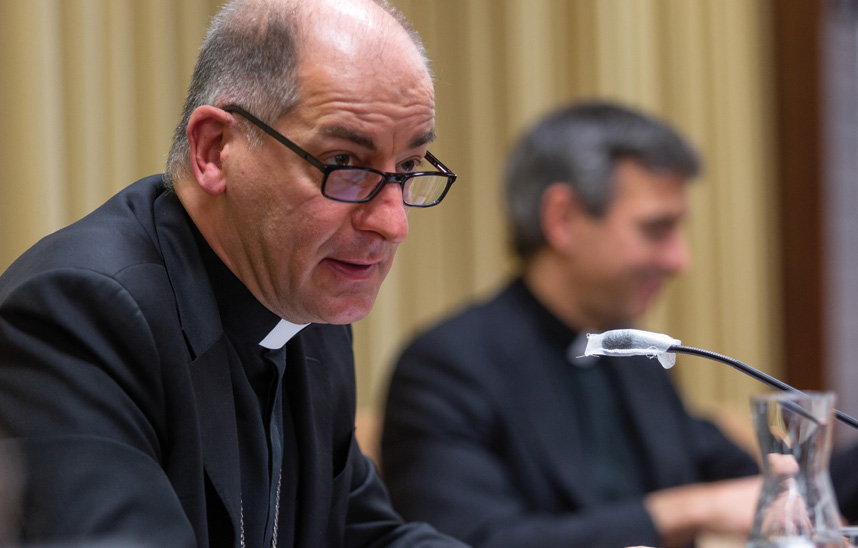Bishop Dal Toso reminds the University of Navarra of the importance of the participation of the baptized in the Church's missionary work
On the 200th anniversary of the origin of the Pontifical Mission Societies, there are more than 10,000 missionaries in Spain throughout the world.

FotoManuelCastells/Dal Toso assures that the Trinitarian mission statement is a mission statement desired by God from eternity and with a horizon of eternity.
10 | 03 | 2022
"Giampietro Dal Toso, president of the Pontifical Mission Societies (PMS), stated this at the University of Navarra, on the occasion of his intervention at the workshop 'The Evangelizing mission statement of the Church', held at the School of Theology. He was joined by José María Calderón, former student of the academic center and director of the Pontifical Missionary Works of Spain, who explained the mission statement in the Church and its future perspective; and recalled that Spain has always been a land of missionaries: "To this day there are more than 10,000 Spaniards who are in some mission statement spread around the world".
Bishop Dal Toso focused his exhibition on the theological principles for missionary action and for the Pontifical Mission Societies. He explained that, in order to reach the mission statement, specifically the mission statement ad gentes, it is essential to have the Trinity as a starting point, in addition to using four elements: dialogue, witness, advertisement and the foundation of new churches.
"Linking the mission statement of the Church with the Trinitarian mission statement not only confers a solid foundation of the mission statement, but also gives it the character of divine work: to be sent by Christ to follow in his footsteps, for the salvation of the world, and strengthened with the financial aid of the Holy Spirit," he said.
In this sense, he emphasized that it is good to avoid any ecclesiological reduction of the mission statement, "it is clear that the mission statement is also the work of the Church, but if the mission statement were only will, the work of the Church would be a model that could be easily exchanged and, above all, would be limited to a purely temporal horizon of organization in this world". And he added: "The Trinitarian mission statement is a mission statement desired by God from eternity and with a horizon of eternity. The mission statement is not at the disposal of the Church, but it is the Church that is at the disposal of this mission statement".
"There is no single culture for transmitting, conceiving and living the Gospel."
In his message he also deepened the universality of the word of God, whose purpose is that all men be saved. Hence the importance of the Gospel always being presented in a concrete culture, because otherwise it could not even be proclaimed: "There is no single culture for transmitting, conceiving and living the Gospel. We cannot enclose the Christian faith within the horizon of a single culture, just as we cannot deny to every culture the possibility of being enriched by the Christian faith".
He explained that a renewed missionary zeal goes through a renewed theological reflection on the mission statement and highlighted some theological elements that govern the Pontifical Mission Societies. He recalled that the PMS were born 200 years ago on the initiative of lay faithful who had understood not only the importance of the participation of all the baptized in missionary work, but that this should reach all places: "The charism of the PMS is to help Christians to live their faith in its missionary and universal quality". And he emphasized that for this to happen these three elements are core topic : "Faith, mission statement and universality".




